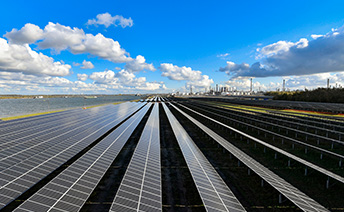National Association of Manufacturers (NAM)
NAM represents 14,000 member companies from across the USA, in every industrial sector.[1]
Membership of board/executive committee: Shell is a member of the board of directors.
- 2022 assessment outcome: Some misalignment
- 2021 assessment outcome: Some misalignment
Summary
Shell benefits from its membership of NAM, in particular from its expertise in trade, environmental regulation, the role of natural gas and tax.
We have found NAM to have some misalignment with our climate and energy transition-related policy positions.
We note that NAM opposed the 2022 US Inflation Reduction Act due to concerns about tax increases.[2] Shell supported the legislation, which has been described as the “largest climate investment in American history”.[3]
We will urge NAM to:
- Explicitly state support for net-zero emissions by 2050 and engage in sustained and constructive advocacy in support of the US target to achieve net-zero emissions by 2050.
- Explicitly state support for putting a direct price on carbon emissions as part of a broader policy framework to achieve net-zero emissions.
- Support the phase-out of unabated coal power generation by 2040.
We will encourage NAM to:
- Support reducing methane emissions throughout the natural gas supply chain through direct regulations such as performance standards based on robust monitoring, reporting and verification frameworks. We also encourage NAM to state support for ending routine flaring by 2030 or sooner.
We will remain a member of NAM at the current time. We will continue to track alignment between NAM’s climate and energy transition-related positions and our own and will be transparent about where we find differences. We will continue to engage the association in areas where we have different views, including through our position on NAM’s board.
Further information
Click on the sections below to read more.
- NAM has stated support for the objectives of the Paris Agreement.[4] It has not stated an explicit position on net-zero emissions by 2050.
- NAM has stated: “A global consensus has emerged that we must restrict global temperature rise to 2 degrees Celsius above preindustrial levels and strive to limit the rise to 1.5 degrees. Either scenario will require massive reductions in GHG emissions over the next 30 years and would likely require net emissions to reach zero in the coming decades.”[5]
- In its 2022 publication Competing to Win, which “serves as a strategic blueprint for the policies manufacturers in America will need”, NAM states that it “laid out a comprehensive roadmap for climate action in “The Promise Ahead,” which included immediate actions for policymakers. Many of these immediate actions were included in the late 2020 energy bill, the 2021 bipartisan infrastructure and climate bill and the 2022 reconciliation legislation. Sustainable permitting improvements, electric grid modernization, climate adaptation and resiliency programs, zero-carbon nuclear power, clean hydrogen, drinking water improvements, efficient manufacturing and new energy innovation programs were all included with robust funding. We must build on these major climate and environmental down payments.”[6]
- NAM opposed the US Inflation Reduction Act of 2022. NAM has stated that it opposed it due to increasing “taxes on manufacturers in America, undermining our competitiveness while we are facing harsh economic headwinds such as supply chain disruptions and the highest rate of inflation in decades”.[7] Shell supported the legislation, which has been described as the “largest climate investment in American history”.[8]
- NAM has not stated a position on carbon pricing. Its climate change principles state that government action to address climate change should “utilize economy-wide policy options that leverage market-based options, including cost containment mechanisms and complementary sector-specific policy where appropriate.”[9] It has also stated that “NAM recommends Congress enact a single unified climate policy that meets science-based targets, ensures a level playing field without carbon leakage and preserves consumer choice and manufacturing competitiveness.”[10]
- NAM has stated support for policies that improve energy efficiency; it has stated that policy is needed to “massively invest in public- and private-sector energy and water efficiency.”[11]
- In 2022, NAM stated that it called on legislators to support “measures to enhance development and deployment of energy-efficient technologies.”[12] [13]
- NAM has stated support for policies that enable the development of decarbonised hydrogen.[14]
- When referring to the early-stage use of renewable energy for thermal applications, including decarbonised hydrogen, NAM has stated that it supports “policies to incentivize renewable thermal energy options, which is critical to supporting lower-carbon footprint for industrial process heat applications”.[15] NAM has stated that investments “should also be made to establish infrastructure for hydrogen power for generation and transportation”.[16]
- In its 2022 publication Competing to win, NAM states that hydrogen is one of the technologies to address the global challenge of climate change.[17]
- In its 2021 Annual Report, NAM references the Infrastructure Investment and Jobs Act and states that the “$9.5 billion to establish programs to demonstrate the production, processing, delivery, storage and end use of clean hydrogen” was a key win.[18]
- NAM has stated support for policies that “promote smart land use and carbon offsets that achieve real, additional, verifiable, permanent and effective emissions reductions”.[19]
- NAM has stated support for the need to “commercialize and deploy” CCUS technology.[20]
- NAM has stated that in order to “meet growing global energy demand and GHG reduction goals, the world must vastly ramp up the deployment of carbon, capture, use and storage technologies”, adding that the US “is well positioned to be the world leader in this emerging technology”.[21]
- NAM has stated that ESG disclosure obligations should focus on material information relevant to company performance and shareholders’ investment decisions.[22] In its 2022 response to the SEC’s proposed climate-related disclosure rule, NAM stated support for a “principles-based framework that enables publicly traded companies to efficiently report financially material climate-related metrics, as well as information about financially material climate-related risks and opportunities, to their shareholders”.[23] However NAM stated that it had a number of concerns with the SEC’s proposal. Shell stated support for the SEC’s proposal, but also noted a number of concerns.
- In its 2020 policy positions, NAM stated that “maintaining coal as part of a diverse energy portfolio and as a viable export commodity provides for strong economic growth”; it has also stated that further “regulatory actions that unreasonably increase the cost of production and use of coal for limited environmental or health benefits are counterproductive. Environmental policies should be applied in a manner that balances the realities of climate change and the important role that coal production and generation play in the nation’s diverse energy portfolio.”[24] It is noted that NAM updates its policy documents on a five-year cycle and has not advocated on coal in 2022.
- NAM has stated support for a “reliable, modern electric grid that ensures manufacturers can access reliable, affordable energy when they need it, even as policies and markets change”.[25]
- NAM has stated support for “policies that encourage an energy mix including clean, renewable and low carbon energy”.[26] NAM has stated support for a “diverse energy strategy” that promotes the responsible development and use of all energy sources, including fossil fuels, nuclear, renewables, energy technologies, and recognises the importance of energy efficiency to meeting future energy demands.[27] NAM has stated that it “opposes federal government mandates for increasing the use of any energy source at the expense of any other”.[28]
- In its 2022 letter to President Biden, NAM stated that it has “long supported an all-of-the-above energy approach, but renewable energy sources alone are incapable of meeting the demand created by increasing electrification”; it also states that experts have predicted that “existing fossil and nuclear generation, which produces more than two-thirds of our nation’s electricity, will be critical to power generation for decades to come.”[29]
- NAM’s 2021 Annual Report references the Infrastructure Investment and Jobs Act and states that the “$65 billion overall investment represents the single largest investment in clean energy transmission in American history, which coupled with faster permitting” was a key win.[30]
- NAM has stated the importance of natural gas in supporting the increasing role of renewables.[31]
- NAM has stated support for reducing methane emissions, noting that “reducing harmful pollutants like methane is a key priority of the NAM’s work on climate action.”[32]
- In November 2021, in response to the US EPA’s proposed rule on methane regulation, NAM stated: “Manufacturers are working with the EPA to share their expertise, and many companies are leading the way in rolling out technologies that make it possible to lower both emissions and costs. We look forward to learning specific details of the administration’s full methane strategy as our sector continues to work to make our planet healthy for future generations.”[33] NAM has not stated an explicit position in support of reducing methane emissions throughout the natural gas supply chain through direct regulations such as performance standards based on robust monitoring, reporting and verification frameworks.
- NAM has not stated a position on ending routine flaring by 2030 or sooner.
No position
No position
- NAM has stated support for policies to facilitate the decarbonisation of heavy industry.[34]
- NAM has stated that leaders must “pursue legislative solutions to climate change that reduce global emissions, promote innovation and new technologies and pre-empt the patchwork of various regulations and lawsuits”, and “coordinate public–private sustainability efforts to develop and implement new technologies and solutions across the manufacturing supply chain”.[35]
No position
No position
[1] https://www.nam.org/about/
[2] https://www.nam.org/manufacturers-remain-staunchly-opposed-to-the-inflation-reduction-act-18530/?stream=series-press-releases
[3] https://www.ceres.org/news-center/press-releases/corporate-leaders-call-congress-promptly-pass-inflation-reduction-act
[4] https://www.nam.org/wp-content/uploads/2020/02/NAM-Policy-Positions-2020.pdf
[5] https://www.nam.org/wp-content/uploads/2021/01/The-Promise-Ahead.pdf
[6] https://documents.nam.org/COMM/Competing_to_Win_2022.pdf
[7] https://www.nam.org/manufacturers-remain-staunchly-opposed-to-the-inflation-reduction-act-18530/?stream=series-press-releases
[8] https://www.ceres.org/news-center/press-releases/corporate-leaders-call-congress-promptly-pass-inflation-reduction-act
[9] https://www.nam.org/wp-content/uploads/2020/02/NAM-Policy-Positions-2020.pdf
[10] https://www.nam.org/wp-content/uploads/2021/01/The-Promise-Ahead.pdf
[11] https://www.nam.org/wp-content/uploads/2021/01/The-Promise-Ahead.pdf
[12] https://documents.nam.org/COMM/Competing_to_Win_2022.pdf
[13] https://www.nam.org/energy-manufacturers-need-policy-support-19319/?stream=policy-legal&utm_source=link&utm_medium=social
[14] https://www.nam.org/2021-annual-report/
[15] https://www.nam.org/wp-content/uploads/2020/02/NAM-Policy-Positions-2020.pdf
[16] https://www.nam.org/wp-content/uploads/2020/02/NAM-Policy-Positions-2020.pdf
[17] https://documents.nam.org/COMM/Competing_to_Win_2022.pdf
[18] https://www.nam.org/2021-annual-report/
[19] https://www.nam.org/wp-content/uploads/2020/02/NAM-Policy-Positions-2020.pdf
[20] https://www.nam.org/wp-content/uploads/2021/01/The-Promise-Ahead.pdf
[21] https://www.nam.org/wp-content/uploads/2020/02/NAM-Policy-Positions-2020.pdf
[22] https://documents.nam.org/tax/nam_comments_sec_climate_rule.pdf?utm_source=258537&utm_medium=email
[23] https://documents.nam.org/tax/nam_comments_sec_climate_rule.pdf?utm_source=258537&utm_medium=email
[24] https://www.nam.org/wp-content/uploads/2020/02/NAM-Policy-Positions-2020.pdf
[25] https://documents.nam.org/COMM/Competing_to_Win_2022.pdf
[26] https://www.nam.org/wp-content/uploads/2020/02/NAM-Policy-Positions-2020.pdf
[27] https://www.nam.org/wp-content/uploads/2020/02/NAM-Policy-Positions-2020.pdf
[28] https://www.nam.org/wp-content/uploads/2020/02/NAM-Policy-Positions-2020.pdf
[29] https://documents.nam.org/ERP/Manufacturers%20to%20POTUS%20re%20Electric%20Security%2006292022.pdf
[30] https://www.nam.org/2021-annual-report/
[31] https://www.nam.org/its-time-to-take-methane-seriously-13913/?stream=issue-energy&utm_source=link&utm_medium=social
[32] https://www.nam.org/its-time-to-take-methane-seriously-13913/?stream=issue-energy&utm_source=link&utm_medium=social
[33] https://www.nam.org/manufacturers-getting-u-s-methane-strategy-right-is-critical-as-we-tackle-climate-change-15574/?stream=series-press-releases
[34] https://www.nam.org/wp-content/uploads/2021/01/The-Promise-Ahead.pdf
[35] https://www.nam.org/wp-content/uploads/2020/01/NAM_CompetingToWin_Environment.pdf










